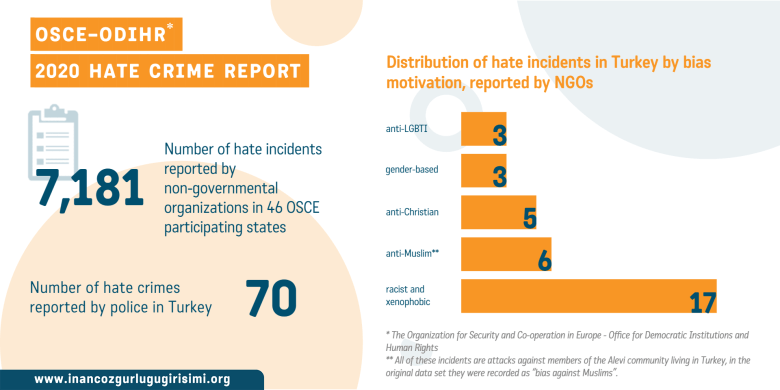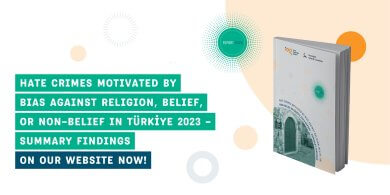OSCE: Lack of comprehensive approach to hate crimes leaves them invisible
The Organization for Security and Co-operation in Europe (OSCE) Office for Democratic Institutions and Human Rights (ODIHR) has published the "20120 Hate Crime Report". “2020 Hate Crime Report” contains quantitative and qualitative information on hate crime incidents in the countries across the OSCE region in 2020.

The Organization for Security and Co-operation in Europe (OSCE) Office for Democratic Institutions and Human Rights (ODIHR) has published the “2020 Hate Crime Report”.
“2020 Hate Crime Report” contains quantitative and qualitative information on hate crime incidents in the countries across the OSCE region in 2020. 42 OSCE participating states submitted official hate crime data for 2020. Of these states, 36 submitted statistical information, while 22 presented disaggregated statistics by bias motivation. The data also include information on hate incidents in 46 participating States, as reported by 136 civil society groups, UNHCR and OSCE missions. According to the report, which is the most comprehensive report on hate crimes worldwide, 7,181 hate incidents were recorded in the region in 2020.
According to OSCE definition hate crimes are;
“criminal acts motivated by bias towards particular groups of people. Bias motivations can be broadly defined as preconceived negative opinions, stereotypical assumptions, intolerance or hatred directed to a particular group that shares a common characteristic, such as race, ethnicity, language, religion, nationality, sexual orientation, gender, disability or any other fundamental characteristic. Hate crimes can include threats, property damage, assault, murder or any other criminal offence committed with a bias motivation”.
Accordingly, the number of recorded hate incidents in the OSCE region by bias motivation is as follows:
- racist and xenophobic: 2385
- anti-semitic: 2316
- anti-LGBTI: 1207
- anti-Christian: 981
- anti-Muslim: 333
- gender-based: 208
- anti-Roma: 84
- disability: 29
- other based on religion or belief: 12
The data on Turkey and national developments
The report reveals that 70 hate crimes was recorded by the police in Turkey and 69 of these crimes are attacks against places of worship and 1 of them is threat or threatening behaviours. However, ODIHR observes that Turkey’s law enforcement agencies have not recorded the bias motivations of these crimes. 27 hate crime incidents, that were reported by the Freedom of Belief Initiative, OSCE/ODIHR, London Legal Group, Holy See, Red Umbrella Sexual Health and Human Rights Association and Transgender Europe are also included.
Accordingly, the number of hate incidents by bias motivation in Turkey are as follows:
- racist and xenophobic: 17
- anti-Muslim[1]: 6
- anti-Christian: 5
- gender-based: 3
- anti-LGBTI: 3
According to ODIHR, Turkey continued implementing ODIHR’s Training against Hate Crime for Law Enforcement (TAHCLE) programme, following a memorandum of understanding signed in 2016. In 2020 alone, the Turkish National Police and Police Academy trained 509 police officers through the “Seminar on Informing Law Enforcement against Hate Crimes”. Yet, ODIHR observes that Turkey would benefit from reviewing the existing legal framework in order to ensure that bias motivation can be effectively acknowledged and appropriate penalties imposed on the perpetrators.
The OSCE report also refers to the Action Plan on Human Rights announced by the Turkish Government in March 2021. Accordingly, it is stated that one of the Action Plan’s goals is dedicated to addressing hate crime and includes:
- A commitment to separately criminalize acts of hate crime which target the human dignity and peaceful coexistence of different groups and to take all the measures necessary to fight against these criminal offences effectively (hate crimes based on language, religion, race, colour, sex, political views, philosophical beliefs, sect, or other similar reasons are specifically mentioned);
- national and international developments to be tracked and periodical reports to be prepared on instances which constitute discrimination or hate speech/crime such as intolerance against Muslims, xenophobia, intolerance against migrants, and racism;
- investigation guides to be prepared with a view to effectively combating discrimination and hate crimes;
- the Turkish Criminal Code to be amended to include a new provision on discrimination and hate crimes;
- continuous monitoring to be ensured by taking into account the opinions of the Criminal Law Science Commission;
- psycho-social and legal support to be offered to the victims of discrimination and hate crimes;
- a database to be created and a proper collection of statistics to be ensured with regard to criminal offences and misdemeanours involving hate and discrimination (to this end, law enforcement and prosecution staff to be offered training);
- and the awareness of hate crimes and discrimination to be raised by means of training and preparing handbooks for media representatives. “The Human Rights Action Plan Monitoring and Assessment Board” has been established to monitor implementation of the Action Plan. The Board is chaired by the President of the Republic and consists of relevant ministers. The secretariat services of the Board, which convenes every 6 months, are carried out by the Ministry of Justice.
General findings and recommendations
According to ODIHR, official hate crime data reported for 2020 vary widely from state to state. However, it is stated that “a lack of official hate crime data does not signal an absence of hate crime, but indicates that the lack of comprehensive approach to hate crimes leaves them invisible and unaddressed”. In the report it is revealed that “more action needs to be taken to increase knowledge of the true number of hate crimes committed and more done to support victims”. It is also stated that “when states do not proactively monitor, record and encourage targeted groups to report hate crimes, the needs of hate crime victims go unmet and their access to justice is hindered”.
In addition, it is emphasized that states that do not report hate crime data are falling short of their OSCE commitments to address such crimes. Although the number of states collecting data on hate crime is increasing, it is also highlighted in the report that “many of those figures are based on inadequate or insufficient recording mechanisms that do not identify the bias motivation behind hate crimes, and also fail to distinguish hate crime from other types of crime”.
According to the OSCE, countries need to do more to raise awareness about the special nature of hate crimes, as well as improving the mechanisms they use to record and collect data on hate crimes. These efforts include increasing the capacity of criminal justice officials to effectively recognize, record, investigate and prosecute hate crimes.
The report also states that hate crime conveys a message to targeted communities that they are not wanted in the society and threats and violence will never be far away. In this context, the importance of OSCE participating States to recognize the harm caused by hate crime, to take action to stress bias motivation in legislation, and ensure that adequate penalties are imposed on perpetrators is emphasized in the report.
The report also highlights the need for authorities to strengthen victim support systems and work closely with non-governmental organizations that offer direct support to victims to ensure victims are protected, enjoy full access to justice and receive tailored expert support.
In this regard, ODIHR offers countries across the OSCE region a range of tools to help them support hate crime victims, improve hate crime monitoring and recording practices, and strengthen co-operation with civil society.
Please click here to access the report.
[1] All of these incidents are attacks against members of the Alevi community living in Turkey, in the original data set they were recorded as “bias against Muslims”.



